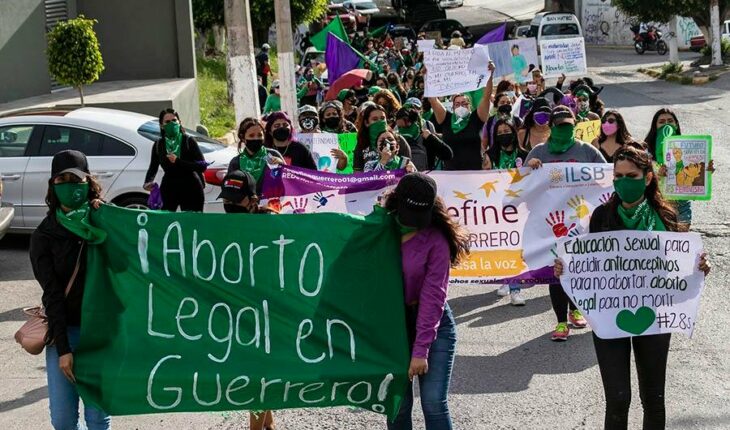Although 23 states are still waiting for the decriminalization of abortion in their penal codes, some, such as Aguascalientes, Puebla and Baja California Sur, have opted for the amparo route to force the homologation with the criteria of the Supreme Court of Justice of the Nation (SJCN) that, since 2021, declared the criminalization of abortion unconstitutional.
Accompanied by the Group of Information on Chosen Reproduction (GIRE), three other states will join the effort through amparo in the next two weeks, as confirmed by the organization. These will be announced once the legal action is promoted, as the dialogue with the collectives at the local level is still continuing to see which of them would be added.
“We are close to filing amparos in five other states of the Republic. It is not yet possible to know which ones, because many collectives ask to have the opportunity to talk among themselves to determine who does go with the amparo and who does not. In the next two weeks we will promote two or three more, and then complete five,” said Melissa Ayala, coordinator of the Documentation and Litigation of Cases area of GIRE.
This, following the determination of the SCJN of September 7, 2021, by which it unanimously resolved that it is unconstitutional to criminalize abortion absolutely, and ruled for the first time in favor of guaranteeing the right of women and pregnant people to decide, without facing criminal consequences.
Although the Court’s decision is a precedent for no local or federal judge to determine to imprison a woman for the crime of abortion, organizations and collectives agree that decriminalization at the local level remains not only important, but necessary as an obligatory step to homologate local legislation with what is determined by the SCJN.
“As the Court has already said, the absolute criminalization of abortion violates the rights of equality, non-discrimination, dignity, self-determination, but it is very important that we also manage to remove abortion from the penal codes, where it has a deterrent effect for women: knowing that there is a possibility that they will be put in jail or the fear that an investigation folder will be opened or a subpoena will be sent to them. What happened in September is historic, but we must not lose sight of the fact that it is the first step: we have to remove abortion from the local penal codes because only in this way, we will achieve that women have autonomy over their bodies and can decide without fear, “says Ayala.
While last Tuesday, with reforms to its local Penal Code and Health Law, Guerrero became the ninth entity where voluntary abortion is decriminalized, under certain conditions – in addition to Mexico City, Oaxaca, Hidalgo, Veracruz, Baja California, Colima, Coahuila and Sinaloa – other states continue in the attempt through amparo or legislative insistence, even after the rejection of several initiatives.
This is the case of Quintana Roo and Puebla, where a strong activism with a lot of presence has even led to the seizure of local congresses, to long processes of initiatives presented, and also to obstacles to dictate them and pass them to full.
“In the case of Quintana Roo, it has been a very long process, very hindered, and part of the agreements was that the plenary could take the initiative, but when it was voted, it did not happen. Others have been presented, with the support of the feminist movement, which have also been discarded, as well as citizen initiatives,” recalls Cristina Santana, coordinator of the REDedefine, of the Simone de Beauvoir Leadership Institute (ILSB).
In Puebla, at least four blocks of initiatives have been frozen or forgotten after taking turns in committees. In other states, such as Guanajuato, there were also initiatives that were forgotten; in Durango, there was a very broad process of collecting signatures for a citizens’ initiative, which was later hindered; in Morelos, the initiatives were never voted on; in Michoacán, although they have also occurred, they have faced various obstacles; in Jalisco, one was presented that remains in the local Congress waiting to be ruled; in Sonora, although there is a strong social mobilization, it has not been reflected in legislative efforts, and in Nayarit, the dialogue between civil society and legislators is just beginning.
“The decriminalizations are advancing in a very historic moment, for which it took many years since the decriminalization of 2007 (in the CDMX) so that Oaxaca could finally in 2019. From there, they have accelerated and a historical struggle that had decades just now is advancing very rapidly throughout Latin America, product of social mobilizations. who have been demanding that there be access to legal, safe and free abortion,” Santana explains.
That is why it is essential at this time, she adds, to talk about the issue, eliminate the stigma about abortion and see it as a very common fact in the reproductive life of women, which is also a matter of public health, social justice and human rights. Although each state faces a very different political and social situation, in all of them there are local collectives and feminist movements that work and insist on decriminalization.
“It is very important to say that in all states there is organized civil society, local collectives and independent activists who are very strongly demanding that abortion can be decriminalized and legalized in their states; many of them have taken up the demands and presented initiatives, but they are stopped for lack of political will. Today we are in another moment in terms of the decriminalization of abortion, because the resolutions that the Court issued last year are key to the decriminalization processes,” Adds Santana.
However, differentiated strategies have also resulted in varied state reforms, most with the consideration of 12 weeks, but not always with a modification to state health laws that guarantee not only the absence of punishment for women and pregnant people, but access to abortion as a safe and free health service. Even so, in the states, it should not be a problem that there is first a reform to the Criminal Code and then to the Health Law, because the federal Ministry of Health has already issued technical guidelines to provide the service, although they are not always complied with.
“Those weeks models are actually already obsolete, because we’re not in 2007 discussing that issue. The Court has already transcended the 12 weeks; then, the door is opened not to hinder for periods. Although there are initiatives that did contemplate the addition in the Health laws, the ideal scenario is to remove abortion from the Criminal Code and, as the Court also said that abortion is a right, to give access and, in that sense, modify the Health laws so that it is recognized, “says the coordinator of reDefine.
Meanwhile, with its legal accompaniment, the area of Documentation and Litigation of Cases of GIRE continues on the path of amparos with the confidence that in the states where the congresses are not willing to legislate, this is the option to achieve decriminalization through the joint work of collectives and organizations.
No certainties at the federal level
At the federal level, the scenario remains uncertain. Although decriminalization in the states is a priority because abortion is generally prosecuted as a crime of the common jurisdiction, and the accusation is made at the local level, it would be necessary to make changes in the General Health Law to guarantee access to free abortion as a service, not only by the local health secretariats, but also the IMSS and the ISSSTE.
To this end, following the Court’s decision of September 2021, 11 senators from all the parliamentary groups of the Senate – including the PAN and the PES – presented an initiative that reforms, adds and repeals various provisions of the General Law on Women’s Access to a Life Free of Violence, the General Health Law and the Federal Criminal Code.
“The reforms are for Social Security and ISSSTE. That is why it is important, because the Federation has many hospital and care services in the states; if decriminalized only in the state, only state health services, or municipal health services if any, can provide legal termination of pregnancy. We have told the IMSS and the ISSSTE that they cannot refuse: if in the state where their clinics are located it is decriminalized and it is a health service, they would have to give it. However, it is not so, it is not so clear; sometimes they do, sometimes they don’t,” says Senator Patricia Mercado.
The proposed initiative details that, as part of the reforms to the General Health Law, a section would be added that specifies: “All persons and institutions that make up the National Health System must provide free safe abortion services, regardless of whether or not the user has the right, in the terms of this Law and the regulatory or normative provisions issued for this purpose by the Secretariat, and must guarantee the pregnant woman or pregnant person the best conditions of safety and quality for medical care”.
In addition, it contemplates the issue of conscientious objection, after the plenary session of the SCJN declared the invalidity of article 10 Bis of the General Health Law, which indicates that medical and nursing personnel can exercise it, and thus excuse themselves. to participate in the provision of services. The Court warned that the law does not establish the necessary guidelines and limits to which the exercise of conscientious objection must adhere so as not to jeopardize the human rights of people, especially that relating to the availability of health services, so it called for its regulation.
“That is also important, because states and health services are sheltering in the issue of conscientious objection, as it is at the moment, so as not to provide abortion services. The issue is reformed right there, in the General Health Law, and since we are talking about a general law, it is mandatory for the whole country, “explains Mercado.
While the criminal issue, says the legislator, is covered with the resolution of the Court last year and advances in local congresses, it is necessary that the granting of the service impacts on federal services, IMSS and ISSSTE: “Regularly it is not done, there is a gap in the sense of whether they are obliged or not, since ‘my clinic is in this state’, but finally it is a federal institution, not a state. There is a vacuum, so it is important to change the General Health Law, because then it already forces all health services to interrupt at 12 weeks.”
So far, the proposed reforms on abortion have not advanced in their ruling or discussion in the federal Congress and their fate is uncertain, because, according to Mercado, it is not a priority for the government, the legislative majority is closely linked to the position of the federal government, and at that level there is, in addition, an intervention and concern of the powers that be: economic, political and ecclesiastical.
In Coahuila, abortion should be considered decriminalized
Both the ILSB and GIRE agree that Coahuila, where for eight months the SCJN invalidated Article 196 of the local Penal Code, which criminalized abortion, should count as a state where decriminalization is already effective, so Guerrero is the ninth entity – and not the eighth – where this occurs.
“I think it is very important to say that abortion is already decriminalized in Coahuila. It is super important to spread this, because they were left thinking that the Legislature still needed to harmonize the Criminal Code of Coahuila, but it has already had effects; it is there that those articles were repealed by the Court’s decision; I think it is important to shout to everyone that abortion is decriminalized in Coahuila,” says Cristina Santana, of REDefine.
Melissa Ayala, of GIRE, reaffirms that, when the Court declared it unconstitutional, the state was left without a crime of abortion, so we would talk about nine states, although it would be pending to know if the local Congress will make any modifications to the Health Law.
“The first step is to get abortion out of the penal codes. The next step, or at the same time it would also have to be worked, is to ensure that in those states where access is decriminalized is guaranteed, and guaranteed in an adequate way: with the necessary equipment, trained personnel and, above all, guarantee that there are doctors and non-objectors in all the states that are going to provide the service, ” Ayala explains.
Although to date Congress has not reformed the law, civil and collective associations agree that the decision of the highest court guarantees that women and people with the capacity to gestate can terminate their pregnancy.
Malu, an activist from Coahuila, explains that, before the Court declared this crime unconstitutional, the state provided care to women who sought to terminate their pregnancy because it was the result of rape or congenital alterations through the Safe Abortion program. Since the scjn ruling, although the local Criminal Code has not been reformed, this service can be provided by the will of the woman or pregnant person, that is, it has not been necessary to change the rules so that the invalidity of criminalization is respected.
“We have decriminalization and there is a program called Safe Abortion, but the care is still not the best. They provide them with medicines and they are procedures they do at home, but if the hospital hours run out, they no longer attend to them or answer the phone. Many of the patients come to us to accompany their procedures, we give them containment and information because unfortunately there are staff who do not treat them well and judge them, “says Malu.
Despite this panorama, he recognizes that, since the decriminalization of abortion, there has been greater demand, which he attributes to the fact that there is also more information about it, accessible to the population. She assures that the Saltillo Safe Abortion Network went from attending 30 requests from women and people who seek to terminate their pregnancy to the same numbermere but every day.
For the activist and abortion companion, the fact that the Criminal Code of Coahuila and the State Health Law have not been modified shows a lack of interest on the part of local authorities to recognize the rights of women and people with the capacity to gestate; however, he says, the decriminalization decreed by the Court has opened the dialogue between citizens to talk about a topic that was previously taboo and today is a reality.
In Puebla, another initiative awaits
Although in the last Legislature, at least four blocks of initiatives were presented in Puebla to reform both the Criminal Code and the state Health Law, the last one, sent in June of last year, a few months after a new Legislature began, was pending and was never resumed.
In January of this year, a new initiative was introduced, promoted by Morena deputies and that only decriminalizes – without reforming the Health Law – so, again, the time of 120 days that local legislators have to rule is running, and that will be fulfilled this month. The ideal scenario, as for all states, would be with both reforms, but for the collective ones, at least decriminalization is an important first step.
“It can be done separately although in itself, in several contexts it has shown the difficulty that implies, when there is reform to the Health Law, that services are given, if there is no regulatory framework, in the end they may not be given in a timely manner,” says Natali Hernández, of the Puebla Legal Abortion Campaign.
In addition, several organizations have begun the dialogue in the state to raise the possibility of 14 weeks, given that the framework of 12 is exceeded, although that initiative has not yet been presented. To this is added that, together with Aguascalientes, they were among the first two states to promote amparo, accompanied by GIRE, to try to promote the homologation of the Criminal Code to the criterion of the SCJN, without going through the legislative route.
“The reflection that several organizations that are working on this issue have had is that the 12 weeks are still an arbitrary criterion; maintaining the penalty after a certain period continues to put at risk women who, for various reasons, do not access a service, do not know it. Sanctioning after those weeks is not what we want; we no longer want more women to be punished, we want this to be a public health issue,” explains Hernández.
However, the scenario in the state, something in which GIRE agrees, is complicated: the legislative sectors in Congress remain divided, internal struggles keep the activists waiting for whether or not the parties could go as a bloc and the radical positions of the right persist. In addition, in the political context, the closeness of the governor and some legislators with the local Catholic hierarchy has been notorious.
Even so, Natali Hernández is confident that it is an issue that cannot be postponed: “They will have to enter this discussion, because the movement has become very strengthened, the political costs can also be charged by organized feminists; the Green Tide is not only the handkerchief and the pose, but more and more women trust that this is the great debt outstanding in the exercise of our autonomy. It’s amazing around Puebla: Oaxaca, Veracruz, Guerrero… if the issue is that we don’t abort, we can go to any other state here next door.”
Cristina Santana agrees that in Puebla, with the seizure of Congress and the strength and pressure of civil society, there is a very strong movement on the issue, but political will has been lacking and it is difficult to know if that context will change.
Another concern also lies in states where there is already decriminalization, but women and people with the capacity to gestate are not clear about the legality or routes to access this service, as detected by REDefine in Veracruz.
“In Mexico City we have a model where there are specialized clinics to perform abortions, but in other states they would not have to wait for there to be, but in the hospitals themselves, medical units and clinics they would have to be providing this service. In Veracruz, we have seen that there are complications in the clarity of where to go to exercise this right, and it would be good to strengthen the mechanisms they have, such as their telephone line, where they sometimes do not answer. After a decriminalization, it is important to make sure that access to this right does happen,” Santana stresses.
In other states, decriminalization by legislative means is so far practically impossible, particularly Chihuahua, Guanajuato, Querétaro, Tamaulipas, Nuevo León and Yucatán, where other alternatives will have to be explored.
With information from Eréndira Aquino.
What we do at Animal Político requiThey are professional journalists, teamwork, maintaining dialogue with readers and something very important: independence. You can help us keep going. Be part of the team.
Subscribe to Animal Político, receive benefits and support free journalism.#YoSoyAnimal





